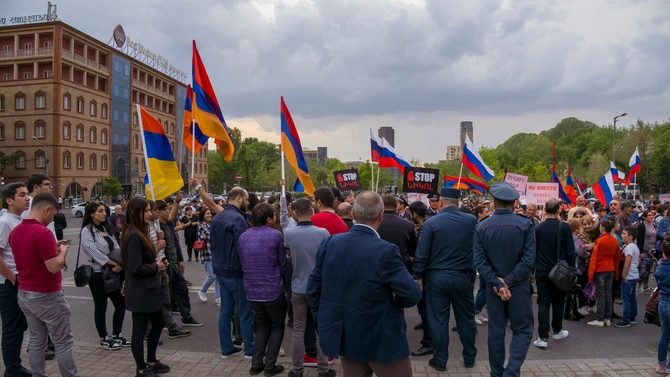
Amid all the attention on the war in Ukraine, two historic foes in the South Caucasus are close to reaching a peace agreement that would help alleviate Armenia’s isolation. The potential rapprochement is in parallel to progress on establishing diplomatic ties between Armenia and Turkey. Together, these factors can potentially upend the geopolitics of the South Caucasus.
The Zangezur Mountains. Image: Szymon Bartosz/Shutterstock
Azerbaijani and Armenian leaders met in Brussels on May 22 to discuss their countries’ peace process, with European Council President Charles Michel facilitating the meeting. The swift execution of some of the topics agreed upon by President Aliyev and Prime Minister Pashinyan during that meeting can be classed as historic.
First, after extensive negotiations, Armenia and Azerbaijan agreed on opening transit routes, including the Zangezur Corridor. Another important outcome of the Brussels meeting was the process of delimitation and delineation of boundaries, with the leaders agreeing to set up a commission on the state boundary between their countries. This was not just talk – by May 24, that commission had already started work.
The gathering in Brussels is another sign of the EU's growing interest in the South Caucasus. Since the beginning of this year, the representatives of the two South Caucasian republics have met almost exclusively under EU mediation. One Russian-mediated exception – that of the foreign ministries on May 12 – yielded no fresh progress.
Though still far from a definitive rapprochement, Armenia and Azerbaijan are poised to reach a tentative peace agreement on effectively ending the conflict between the two sides. Over the past several months, a number of hints made by Armenian officials indicate a significant shift in Yerevan’s perspective on the long-simmering Nagorno-Karabakh conflict. It is a major deviation from previous official Armenian diplomatic rhetoric, which has traditionally regarded the separatist exclave as distinct from Azerbaijan. That distinction is what had previously undermined every major diplomatic attempt to solve the problem.

Pashinyan's government also has to deal with a less patient public in Armenia, where the ruling party is constantly under attack by the opposition. Former President Robert Kocharyan and his supporters might not be popular with most Armenians, but they have the potential to hinder the Armenian parliament's acceptance of additional Karabakh provisions. On April 26-27, scuffles broke out in central Yerevan, where protesters gathered from various parts of the country to demonstrate against the potential deal. Since then, protests have continued for weeks in Yerevan, but the threat to Pashinyan's administration does not appear to be existential. He seems optimistic that he will be able to weather the storm, as Armenia's prior rulers were largely connected with a corrupt system that weakened Armenia's position. In reality, there is widespread agreement in Armenia that the defeat in the 2020 Second Nagorno-Karabakh War cannot be blamed solely on Pashinyan’s administration but must take into account decades of failings from the previous Republican Party regimes.
Meanwhile, the pro-peace Armenian government faces fierce resistance from elements in the large Armenian diaspora, with some voices already calling for a boycott of a possible agreement. This could result in decreased diaspora support, both financial and political, further complicating Pashinyan's situation. However, there appears to be a growing disconnect between the perspective of Armenians abroad and the realities experienced by citizens actually living in Armenia. Notably, anti-Turkish sentiment is not as strong in Armenia as in the diaspora. Also, many resident Armenians believe that progress with Azerbaijan is necessary - an unthinkable possibility for great numbers of those living outside the country.
Essentially, for those in Armenia, it is apparent that a wide spectrum of the population supports the PM, mainly because there is no viable alternative. The possible rapprochement with both Turkey and Azerbaijan simply offer the greatest potential economic and geopolitical benefits.
The change in Armenia’s rhetoric is significant, but it also reflects the changes on the ground. The Second Karabakh War irreversibly tilted the geopolitical balance in favour of Azerbaijan.
The growing reconciliation between Armenia and Azerbaijan is also connected to the fledgling rapprochement between Armenia and Turkey. Ankara and Yerevan have stated their willingness to establish diplomatic relations and reopen the long-closed border. This reflects Turkey's rising influence in the region as it seeks to expand its footprint in the South Caucasus via the emerging corridor between Nakhchivan and the southernmost section of Armenia. A military component should be introduced to the infrastructure. Turkey has deepened its ties with Azerbaijan, which it sees as a springboard for its grandiose goal of a mostly Turkic Central Asia.
Turkey's rising influence in the area raises issues about Russia's regional dominance and how serious Moscow is about reviving railway infrastructure. Skepticism of the Kremlin's motives is understandable, given the Kremlin's dislike for Ankara's connections with Baku, but there's nothing the Kremlin can do about it except using military force.
Moscow remains a powerful player due to its military capacities: willingly or otherwise, all of the South Caucasus republics house Russian military bases on their territories. Russian troops are unlikely to leave Azerbaijan after their first peacekeeping mandate ends in 2025. Some consider that Russia is deliberately dragging its feet on the issue of long-term peace in order to maintain its influence.
While a ‘great power competition’ plays out between Russia and Turkey, surprisingly silent on the sidelines is the region’s third critical player – Iran. Tehran would naturally benefit from a growing Armenian openness with its neighbours, notably a restored railway connection with Armenia and onward to Russia (via Azerbaijan). One obvious downside for Iran would be the partial loss of existing transit trade between Nakhchivan and Azerbaijan proper once the Zangezur Corridor through Armenia becomes operational. However, to mitigate that, a parallel corridor via Iran on the south side of the Araz River has also been agreed on between Baku and Tehran.
Many questions will remain unanswered as two long-time adversaries get closer to reaching a deal to finally terminate decades of conflict. What is certain, however, is that the reconciliation between Armenia and Azerbaijan will have far-reaching implications for the geopolitics of the South Caucasus. Though Russia will continue to play a vital role, now with Turkey, the assumptions that have regulated the balance of power in the area since the 1990s have been challenged. We’re entering a period when a new balance of power is emerging. Russia’s exclusive dominance over the region is now being substituted by a system where simultaneously, several regional powers will have their say in the region’s affairs.
Share on social media